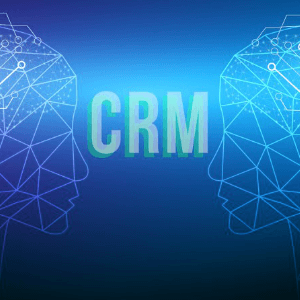
How Artificial Intelligence Is Transforming CRMs
2019/2020 has already seen a seismic shift towards a unified approach between artificial intelligence and sales, and this momentum is about to revolutionise how CRMs are used today.
According to a report by IBM, almost one-third of companies reported leveraging AI in their business and playing a core role in the sales process. One of the most profound applications in this area has been the integration with CRMs. It’s an area that has struggled in the past and still faces many challenges. One of the key hurdles with CRMs is that sales professionals have long struggled to adopt a disciplined administrative approach to entering data and updating customer files.
This year and beyond will see a leap forward in AI advancement solving issues such that of missing data, duplicate data, and a whole heap of garbage that CRMs are famed for. Here’s how AI will transform CRMs.
1. Data ingestion and retrieval
Populating a CRM all starts with data ingestion and retrieval. So let’s look at how AI can remove the manual process and heavy lifting away from sales professionals. Based on a HubSpot survey, sales professionals spend 17% of their time entering data – that’s equivalent to one a day a week. Little surprise why an obstacle like this can hold back CRM adoption right at the start.
Artificial intelligence not only empowers sales professionals to eliminate manual data entry, it also bolsters their ability to centralize disparate customer databases and, in turn, capture the complete customer lifecycle—whether it has transpired via email, phone conversations, chatbots, etc. CallMiner Eureka, for example, uses artificial intelligence and machine language to capture and transcribe customer interactions. Transcriptions are tagged according to key topics and a rich categorization schema. When this data is ingested into a CRM, it can surface key insights, including objections, specific data with respect to competitors, and ideal use cases. Salespeople can search transcript metadata for keywords, phrases, or even acoustics such as increased voice intonation that may signal excitement and increased interests. With the air of topic clusters and frequency maps, salespeople are equipped to detect vital customer trends.
2. Data integrity
We know your pain. You’ve got a massive amount of contact data, but you know it’s full of invalid email addresses, incomplete customer contact data, and duplicates. Research by Dun & Bradstreet says 91% of CRM data is incomplete, 18% is duplicated, and 70% is rendered out of date each year. The consequences of dirty data are staggering. It disrupts sales pipelines, wastes resources, productivity lost, failed communication—both internal and external—and wasted marketing spending.
By 2025, we will create 180 zettabytes of data each year. Do you really think humans can ensure optimal data quality?
The beauty of artificial intelligence is that it is able to detect irregularities, anomalies, duplicates, and other errors, including missing data. Yes, you heard right. Missing data.
By integrating an AI platform, such as Cloudapps, with third-party databases, such as Salesforce, artificial intelligence can also interpolate missing records and update records in real-time as contact and other data changes. It can automatically detect duplicates. Artificial intelligence tools are integral to data cleanliness. Hard to imagine how artificial intelligence isn’t already a core part of any CRM system.
3. Predictive lead scoring
It’s all about the deals. Seventy-four percent of companies state that converting leads into customers is their top priority, and artificial intelligence can prime sales reps by supercharging the lead scoring abilities with highly accurate predictive analytics and algorithms, such as Deep-Learning.
Rules-based lead scoring has been the historical norm, but any marketeer can attest to the fact that just because a lead attains a certain lead score and deemed to be an MQL (marketing qualified lead), is in fact a complete dud.
That is, they’ve scored and ranked leads manually, according to a set of rules— “If this, then that.” This approach is outdated and suboptimal.
Artificial intelligence, in particular Deep Learning, can analyze millions of different historical and real-time attributes, including demographic data, firmographic data, geographic data, activity data and web behaviour, to determine customers’ buying readiness.
When integrated with CRM systems, artificial intelligence can analyze won versus lost deals to detect trends that can inform predictive lead scoring methods.
This is the motivation for sales organizations to shift from rules-based lead scoring to predictive lead scoring. More quality leads mean taking home bigger pay-checks!
4. Prescriptive account-specific recommendations
Up until quite recently, many individuals were sceptical of the threat of artificial intelligence taking over jobs by foraying into the sales environment and displacing humans. In short, this blinkered belief no longer holds water as artificial intelligence has time and time again proven to enhance, not replace, the human component of sales. Sales processes like rapport, people-buy-people, lead sourcing all require a human to carry out.
Here artificial intelligence can assume a new role as a trusted advisor providing the salesperson augmenting sales intelligence, such as the capability to generate targeted recommendations for salespeople, including personalized sales and marketing collateral to be delivered at specified times.
The most effective artificial intelligence-powered CRMs, such as Cloudapps, will also provide the “why,” informing salespeople as to the rationale behind certain prescribed courses of action.
To wrap it up
Businesses spend thousands on CRMs for their businesses, especially the larger global enterprises with typically 1000+ sales reps worldwide, yet it is treated as a data dumpsite of dirty data.
The sales professionals of the future will use artificial intelligence to complement their efforts and skillsets. When it comes to CRMs, the time is now. Artificial intelligence promises to equip salespeople with augmented sales intelligence with targeted and prescriptive recommendations.

